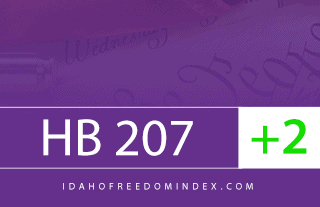


Bill description: Local government officials could stop massive property tax increases by preventing the accumulation of “foregone balances.”
Rating: +2
Analyst note: This bill is an amended version of House Bill 103 from earlier this legislative session. The amendments to this bill have been taken into account for this analysis.
Under current state law, local taxing districts can increase their total property tax collections by 3 percent a year, exempting annexations and new construction. As part of property tax limitation, the state government allowed local governments to raise property taxes by less than the maximum amount each year and maintain a “foregone balance” that could be assessed, if needed, sometime in the future. Taxing districts, however, have accrued very large foregone balances, creating the potential for massive and unexpected property tax increases. House Bill 207 attempts to address this issue.
Does it directly or indirectly create or increase any taxes, fees, or other assessments?
Under current law, local taxing districts can recover their foregone balances “by certifying, in addition to any increase otherwise allowed, an amount not to exceed one hundred percent (100%) of the increase originally forgone.” The proposed statute provides policymakers a second option to, “Disclaim the right to recover all or any portion of that year’s forgone increase by adoption of a resolution declaring the same.” The local district is under no obligation to adopt the resolution. The bill provides a new decision point during the adoption of the budget. Passing a resolution to disclaim foregone taxes could help prevent future tax increases. (+1)
Does it in any way restrict public access to information related to government activity or otherwise compromise government transparency or accountability? Conversely, does it increase public access to information related to government activity or increase government transparency or accountability?
This bill would require a taxing district to hold a public hearing before it “elects to budget less than the maximum allowable increase in the dollar amount of taxes.” This would give the public a voice on a matter directly affecting their taxes. (+1)


